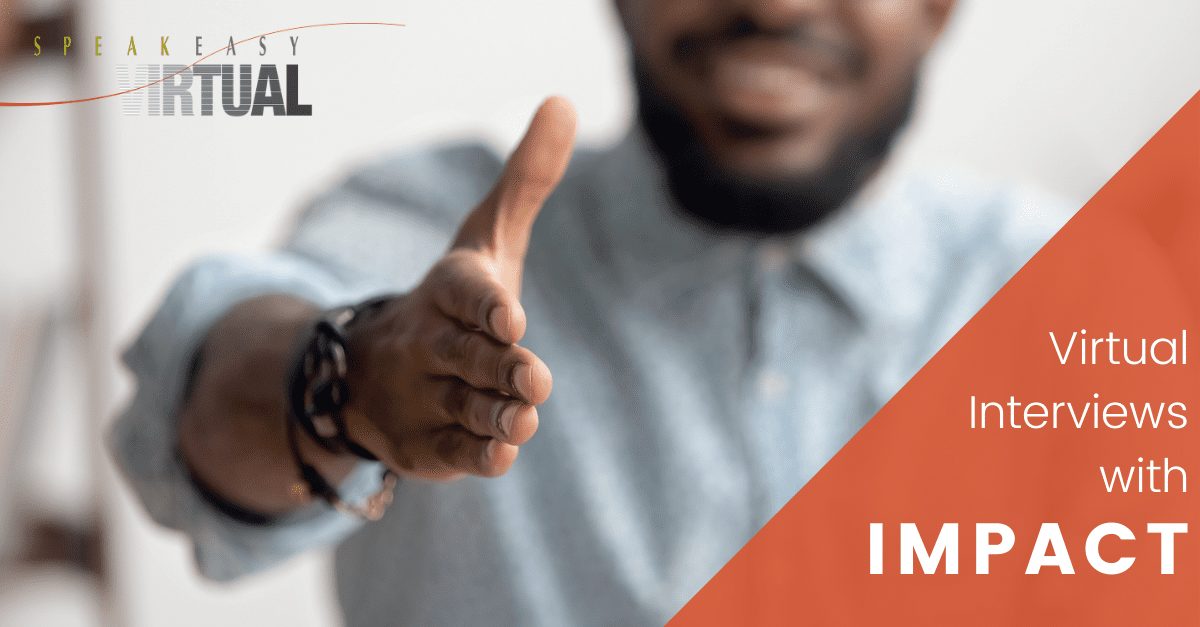
19 Oct Virtual Interviews With Impact
Within the last year and a half, our methods for conducting business have changed and “business as usual” is no more. Organizations have traded in meetings in conference rooms for collaborative virtual calls. With the shift to entirely virtual, or hybrid working models, the process for hiring talent has followed suit. With that change, it’s more important than ever to be impactful during virtual interviews.
For some individuals, interviewing virtually can seem more nerve wracking, while others may feel more comfortable interviewing than they ever have before. Despite your personal feelings toward virtual interviews, preparation for them and succeeding within the interview depends on your ability to connect with the interviewer and communicate your value to the organization. Below you’ll find general best practices for interviews and tips for virtual interviewing success.
General Best Practices
Despite the format or location, there are a few questions you can expect in any interview. It’s best to go over these common questions and prepare talking points, so that you’re as prepared as you possibly can be. Something that’s becoming more common, and what many professionals suggest is preparing your own questions for the interviewer. This shows initiative and genuine interest in the company and position you’re applying for. However, you should avoid asking questions that have either been covered during the interview, or ones that don’t deepen your understanding of the role and the company. Try to craft questions that help you better understand the job responsibilities, the workplace culture, and help you get to know more about who you’ll be working with and for.
Prior to the interview, you should do some research surrounding the industry the company operates within to educate yourself about industry trends. It’s wise to research the company but understanding the industry trends exhibits your knowledge and shows a genuine interest in the field.
Doing Well in the Virtual Interview
Virtual interviewing isn’t much different than interviewing face-to-face. However, there are details and preparation points that are specifically for virtual interviews…
- Before the interview, do a test run with the technology you’ll be using for the interview. Common occurrences, and something we often can’t help, are technical issues associated with the technology being used. To limit technical issues, check your audio and visual capabilities prior to the interview.
- Be sure to clean your surroundings and find a quiet place. Eliminate any distractions from the background, as this could cause the interviewer to pay attention to distractors instead of being fully engaged and listening to what you have to say.
- Although the interview is virtual, be sure to dress properly. Just as you would in a face-to-face interview, be sure to dress appropriately for the occasion. Even though only half of your body will be seen, dressing professionally will help place you in the mindset of interviewing.
- When speaking to the interviewer, look directly into the camera, not at your screen. As tempting as it is to look at the screen when talking, this is not engaging for your listener. Even though you may be looking into the interviewer’s eyes on screen, on their end, it appears as though you’re looking down and not directly at them. Practice looking into the camera before the interview, so that you can get comfortable with this method of engagement.
Now You’re Ready to Interview
Above all else, the most important thing to remember in any interview, virtual or face-to-face, is to present yourself in the most authentic way possible. You’ve already intrigued the organization’s hiring managers enough to land an interview. If you’re feeling anxious before the interview, get up, move around, and take some deep breaths to release some of that anxiety. Once in the interview, it’s your time to shine and show the interviewer why you’re the best candidate for the position. Don’t regurgitate the information on your resume, but instead provide behavioral examples of real work situations where you applied your knowledge. Using these tools and adhering to best practices will give you a solid foundation for virtual interviewing.
If you’d like to learn more about our virtual communication development programs and coaching options, visit our virtual programs page.

